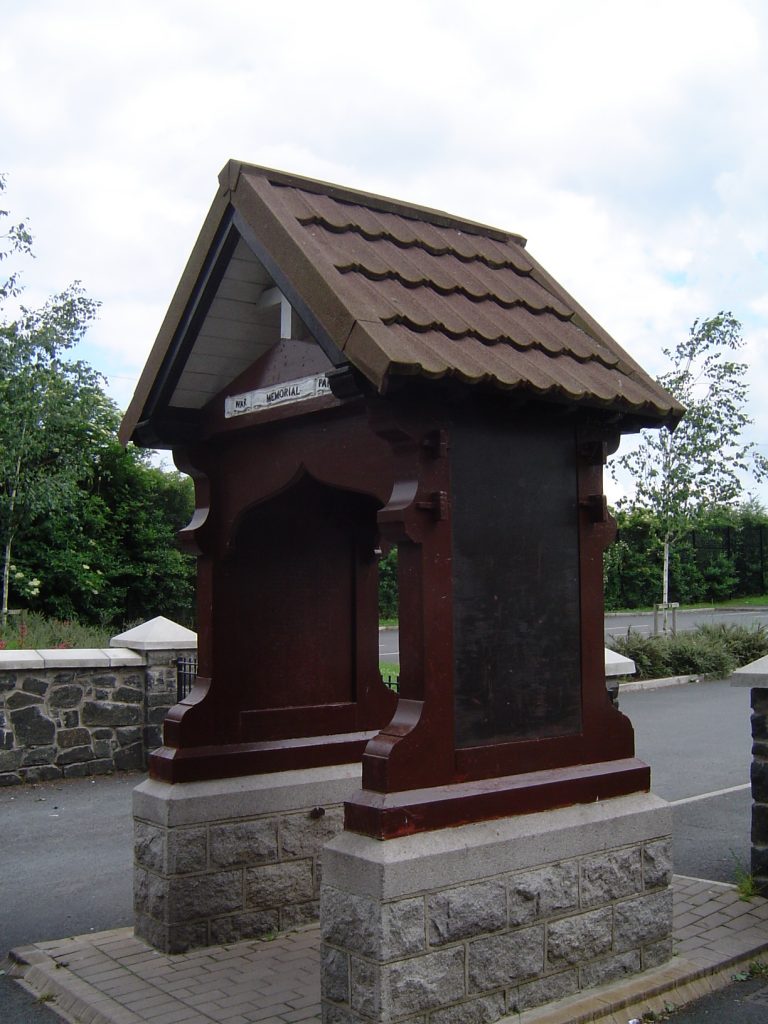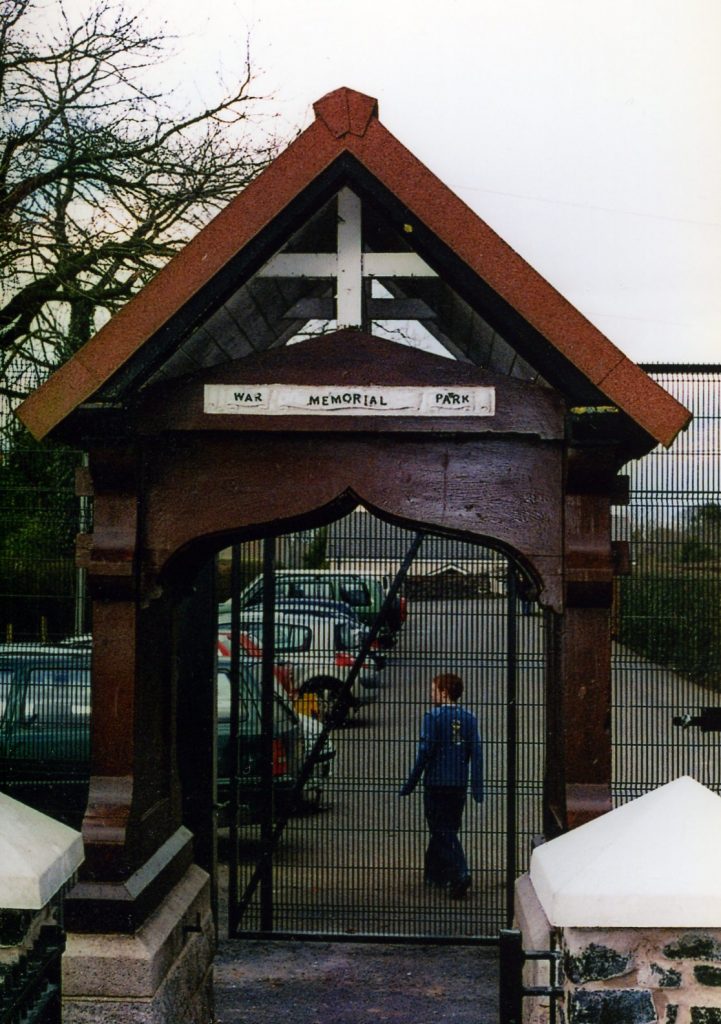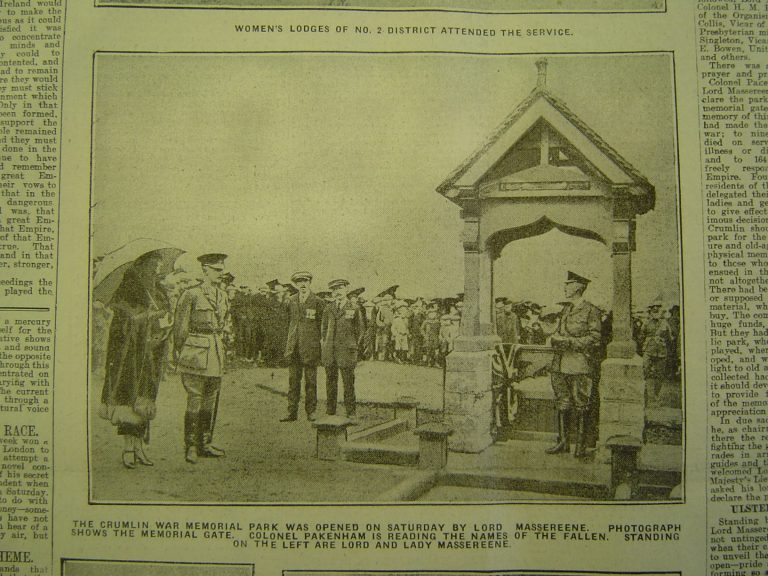CRUMLIN, Co. Antrim

The people of Crumlin and Gartree. In affectionate remembrance of the men and women who gave their lives for their country in the Great War 1914 – 1918.
McKibbin (McKibben), Robert [a latter addition]
Adair, George, Private, “D”. Comp.11th Batt. Royal Irish Rifles. Son of Mary Adair, of Seacash, British, Crumlin, Co. Antrim, and the late James Adair
Ayre, Samuel, Private, 11th Batt. Royal Irish Rifles. Son of James Ayre, of Glenavy; husband of Rachel Ayre, of Hill St., Crumlin. Co. Antrim
Bell, Arthur, Private, “A” Comp. 9th Batt. Royal Irish Rifles. Son of Daniel and Mary Jane Bell, of The Diamond, Crumlin, Co. Antrim.
Bell, Robert, Corporal, 1st Royal Irish Fusiliers.
Bell, William, Private, 2nd Batt. Royal Irish Rifles.
Boyd, William, Sergeant-Farrier, Canadians
Browne, George, Private, 11th Batt. Royal Irish Rifles.
Bushe, Samuel, Private, “D”. Comp. 11th Batt. Royal Irish Rifles. Son of the late Mrs. Ellen Ferris; husband of Mrs. Emily Bushe, of 20, Helen St., Crumlin, Co. Antrim
Campbell, James, Private, 16th Batt. Royal Irish Rifles. Son of Robert and Mary Campbell, of Crumlin, Co. Antrim.
Campbell, Philip, Royal Irish Rifles.
Clarke, Edward R., 2nd Lieutenant, K.R.R.C.
Clarke, William, Sergeant, 11th Royal Irish Rifles.
Cormican, Hugh Patrick, Stoker. H.M.S. Hawke, 15th October 1914
Cosgrave, Michael, Gunner, 70th Battery Royal Field Artillery. Son of James and Margaret Cosgrave, of Main St., Crumlin, Co. Antrim
Fleming, John, Private, 11th Batt. Royal Irish Rifles.
Gillen, John, Private, Royal Irish Rifles. Son of Mrs. Agnes McCormick, of 4, Helen St., Crumlin. Buried in Crumlin Presby. Cem.
Heaney, Thomas, Private, Royal Irish Rifles.
Hull, Robert, Private, ANZACS.
Jacob, Frank, Gunner, Royal Field Artillery.
Johnson, Joseph, Private, Royal Irish Fusiliers.
Lindsay, Hugh, Lance-Corporal, 11th Batt. Royal Irish Rifles.
Logan, William, Private, 11th Batt. Royal Irish Rifles.
McCleary, Samuel Private, Royal Irish Rifles.
McConkey, Matthew Private, 11th Batt. Royal Irish Rifles.
McGarry, James, A. Private, R.I.G.
McQuillan, William, Sergeant, 11th Batt. Royal Irish Rifles.
Morrison, Lizzie N., V.A.D. ????? and Solonica, and previously The Scottish Women’s Hospital.
Mulholland, Patrick, Private, 11th Batt. Royal Irish Rifles.
Mulholland, Robert, Lance-Corporal Can. Infantry, son of Mrs E. Mulholland 69, Crosshill Cottages, Crumlin (BT 11/11 16 5e)
Patterson, Robert, Private, 11th Batt. Royal Irish Rifles.
Sherlock, Robert, New Zealanders.
Stewart, Daniel, Private, Royal Irish Rifles.
Williamson, Andrew, Private, 11th Batt. Royal Irish Rifles.
Williamson, Robert, 237076, Canadian Expeditionary Force, mother resides at Ballynageragh, Crumlin.
Williamson, Samuel, Private, 11th Batt. Royal Irish Rifles.
Williamson, W. J., Private, 11th Batt. Royal Irish Rifles.
Wilson, Samuel, Private, Royal Irish Rifles.
Yarr, William, Private, 696100, Canadian Expeditionary Force.

CRUMLIN MEMORIAL PARK.
HONOURING THE BRAVE.
CRUMLIN’S EVERGREEN TRIBUTE.
IMPRESSIVE PROCEEDINGS.
The Crumlin War Memorial Park, dedicated to the men who fought and the women who served in the Great War, was opened on Saturday afternoon by Viscount Massereene, H.M.L., Co. Antrim. The Park embraces an area of 4½ acres. Portion of the ground will be allocated to football, cricket, and lawn tennis, an adequate space earmarked for a children’s playground, and the residue reserved as a rendezvous of leisure for old and young. Inside an imposing gateway of granite, surmounted by an arch of solid oak, are enshrined on tablets the names of those who fought and fell in the fight for freedom. Altogether, the memorial represents a unique tribute to the brave, the memory of whose deeds will survive for all time. To present and future generations the evergreen landscape of the Crumlin Park will bequeathed the message, “Go where glory waits thee.”
The rain robbed the ceremony of an environment which more favourable atmospheric conditions would have created, but the weeping skies had the effect of accentuating the impressive solemnity of the occasion.
The guard of honour consisted of ex-soldiers of all grades, commanded by Lieut. John Lyle R.I.R. There was also a contingent of Girl Guides, furnished from the Crumlin, Gartree, and Killead Companies (under the supreme command of Mrs. Molloy, Divisional Commissioner for South Antrim) and in charge of Captain Canning, Miss Canning, Captain Rankin, Miss Macfarlane, and Captain Fuller; as well as Boy Scouts from Crumlin and Gartree. Other officers present were-Major Cavendish Clarke, later 11th Royal Irish Rifles; Lieut.-Col. Richardson, late North Irish Horse; and Dr W. Fitzgerald, later Royal Air Force. The band of 2nd Green Howards (by kind permission of Lieut.-Col. G. Mairis, D.S.O.) furnished the musical numbers.
At 3.30 the proceedings opened with a reception of H.M., Lieutenant for County Antrim by the committee at the outer gate of the park. A procession to the memorial gateway followed, Lord Massereene being escorted by Colonel H. M. Packenham, C.M.G. (chairman of the Organising Committee); Rev Canon Collis, Vicar of Antrim; Rev J. A. Canning, Presbyterian minister of Crumlin; Rev R. Singleton, Vicar of Gartree ; and the Rev S. E. Bowen, Unitarian minister of Crumlin, and others.
There was a brief religious service of prayer and praise.
Colonel Packenham prefaced his request to Lord Massereene to unveil the tablet and declare the park open, by explaining that the memorial gateway had been erected to the memory of thirty-two good men and true who had made the supreme sacrifice in the late war; to nine men and women who had died on service or from the effects of illness or disease contacted on survive, and to 164 men who willingly and freely responded to the call of the Empire. Four years had elapsed since the residents of the district, at a public meeting, delegated their authority to a committee of ladies and gentlemen, who were empowered to give effect to their wishes. Their unanimous decision was that the war memorial in Crumlin should take the form of a public park for the edification of youth and pleasure and old age, combined with some form of a physical memorial to those who had gone and to those who had served. The delay which ensued in the execution of the scheme was not altogether the fault of the committee. There had been a great inflation in the value, or supposed value, of land and building materials, which it was almost impossible to buy. The committee, not being endowed with huge funds, had to wait before investing. But they had at last given to Crumlin a public park, where games of all kinds could be played, where its resources could be developed, and which would be a source of delight to old and young. Nearly all the money collected had been absorbed, and in future it should devolve to the people of the locality to provide funds for the care and upkeep of the memorial ground, and thus show their appreciation of the gift.
In due sadness and with great sympathy, he, as chairman of the committee, welcomed there the relatives of those who had died fighting the good fight; he welcome his comrades in arms, he welcomed also the Girl Guides and the Boy Scouts of the district; he welcomed Lord Massereene, not only as his Majesty’s Lieutenant, but as a soldier, and he asked his Lordship to unveil the tablet and declare the park open.
ULSTER’S NOBLE RESPONSE.
Standing beside the memorial gateway, Lord Massereene said that feelings of pride, not untinged with sadness, came over him when their chairman very kindly asked him to unveil the tablet, and to declare the park open-pride at having the honour of performing so worthy a task, sadness that the thought uppermost in their minds was the loss of so many gallant and useful members of the community. He thought that no event showed more unmistakably the fine fighting spirit that was in Ulster than the response which the province made when the call came from the Empire in the time of her dire necessity. He would just like, for a brief moment or two, to recall to their memories what Ulster did in those fateful years, 1914 to 1918. She raised some 75,000 men. She was the only province in Ireland to raise and maintain a division entirely her own in the field. She furnished recruits to every branch of the service- the Navy, the Army, and the Air Force-and, in addition, she organised, raised, and supported many other necessary agencies to further the Great War. These he would not then enumerated, but in passing he would like to mention especially the hospital side of the work, and he would like also publicly to pay his tribute to the women of Ulster. Amongst the names recorded on the memorial tablet was that of one sister who laid down her life in Salonika ministering to the wants of others. He sometimes thought they did not sufficiently appreciate and recognise the great sacrifices that their women rendered to the Empire during the war. The work they did was somewhat overshadowed by the heroic deeds of the men. Their work was not always in the limelight. They hadn’t, it was true to bear the stress of shot and shell and to stand the strain, the inconvenience, the horrors and discomforts inseparable from modern trench warfare; but they had to exhibit a steadfast courage, a serene fortitude, an unfailing sympathy and a cheerful countenance at all times whilst going about their duties, whether in the hospitals, on munitions, or in whatever capacity they were called upon to render service. How often-and only the women could tell-did a smiling face, conceal an aching heart! Let them never forget the great part their women played in the war. But for their loyal cooperation they could never have won through. Whatever task or duty they were called upon to undertake, they never failed to nobly rise to the occasion. There was but one order of the truly great-that order of men and women who were prepared to die for what was right. The names on their memorial were inscribed on the roll of that Order. To all of them, especially to the young, he asked that they should ever keep fresh in their memories what their heroes had died for. They died that we might live. They had bequeathed to them a torch-the torch of duty, self-sacrifice and patriotism-which they in Ulster would never allow to be quenched. In conclusion, he would quote the words by the King in a cemetery near Boulogne at the end of his Majesty’s pilgrimage to the graves of the Fallen in France: “As our dead are equal, in sacrifice, so are they equal in honour, for the greatest and the least of them have proved that sacrifice and honour are no vain things, but truths by which, the world lives.”
UNVEILED IN SILENCE.
His Majesty’s Lieutenant thereupon unveiled the tablets, and Colonel Pakenham read the names of the fallen.
Buglers thereupon sounded the Last Post and the Reveille.
Mr. J. Milne Barbour, in proposing a vote of thanks to Lord Massereene, expressed the appreciation of that community for the sympathetic way he had referred to the sacrifice and gallantry of the men and women of the district. Theirs was not a populous area, and the fact that so many had voluntarily answered the call of their country, must be a great source of pride. It should also be an inspiration, to each and all to never fail in their duty and to always work for the welfare of their country. In this connection Lord Massereene had shown them a noble example. He served with marked distinction not only in the South African, but in the Great War, and when peace came he took his place as a member of the community, and threw his whole influence and prestige of the position he enjoyed at their service in helping to forward every good work. He was at present Parliamentary Secretary to the Senate of Northern Ireland, and his whole career was an incentive and an inspiration to them, and whatever he undertook for the welfare of the country should receive their willing and energetic support. Alluding to the memorial, in his concluding words, Mr. Barbour said that in maintaining the park they would be honouring the dead and perpetuating a place for recreation and rest.
Dr. Hunter seconded the vote, and suggested that the motto for all employees should be “ex-Servicemen first.”
The proceedings terminated with an inspection of the guard of honour, Boy Scouts and Girl Guides, by his Majesty’s Lieutenant for the county, and the singing of “God Save the King.”
Belfast Telegraph July 10th 1922.
Crumlin Memorial Orange Hall
A brass container. containing the roll of honour of those who fell in the Great War. was placed in the foundation stone of the Crumlin Memorial Orange Hall, Easter Monday, April 1927.
Belfast Telegraph, 16th April 1927 page 12


If you can supply additional information, photographs of War Memorials in the nine counties of Ulster, or wish to report broken links, make comments, suggestions, requests, etc. please email
uwms@outlook.com
All contributions will be acknowledged.
Research undertaken when time permits.